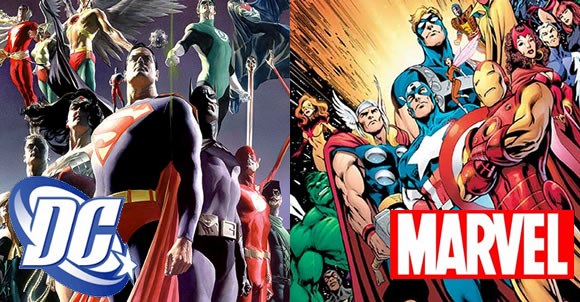Eulogizing Comics Before Their Time
My foremost passion is anime, so indulge me for discussing a secondary interest, American comic books.
Over the past few years I’ve seen an increasingly urgent and vehement collective assertion from seemingly outside observers that America’s comic book industry is declining to the point of artificial respiration. Earlier this month Forbes columnist Rob Salkowitz mused over the possibility that AT&T, the present owner of DC Comics, could transition DC into a “lifestyle brand” managing the iconography of comic book characters while ceasing creation and publication of new comics. Similarly, plenty of pundit speculation has suggested that Disney may value Marvel Comics more as a literal “house of ideas” than as a publisher. Industry critics supplemented these speculations with statistics that annual domestic comic sales are in decline, and support for comics is transitioning to crowd-funding. Artist Doug TenNapel’s Earthworm Jim: Launch the Cow generating $100,000 in pre-sales in 24 hours is frequently cited as evidence for the burgeoning market of crowd-funded comics.
I have a great suspicion that most of this criticism is coming from observers and pundits who don’t actually buy comics routinely. Indeed, I have seen comic shops close. In the past five years seven comic stores in my local area have closed. However, none of them closed due to loss of comic buying customers. Those stores closed due to owner retirement, drastic increases in rent, or mismanagement unrelated to patron support. I visit my local comic shop weekly, and regularly visit other local comic stores. I see a tremendous devotion and support from the patrons who visit local comic shops. This past weekend I attended the first day of Tampa Bay Comic Con. Contrary to the doom and gloom that critics pin to the Captain Marvel character, I saw multiple unrelated teenage girls at the comic show asking for and buying Captain Marvel comics.
Crowdfunding has proven to be a viable funding method for aspiring creators, as well as a risk-free enterprise for established commercial companies. But it’s not the future of America’s comic industry. I’ve lost count of the number of cynics who cite examples of crowdfunded comics generating staggering revenues. However, the examples highly misleading. Not only are the “$100,000 in 24 hours” instances the rare outlier exceptions, the pundits fail to mention that, for example, Doug TenNapel’s tremendously successful crowdfunding campaign was patronized by only 7,674 individuals when it initially ended. If the most successful crowdfunded comic book campaigns reach fewer than 8,000 people, then crowdfunded comics aren’t remotely reaching a large enough audience to compete with or supplant the traditional print comic book industry.
Moreover, although I’m not a businessman, I suspect that AT&T or Disney killing DC or Marvel as comic creating publishers would be a severe self-inflicted wound. Today’s highest grossing motion picture of all time is a comic book movie. In other words, it’s a movie based on printed comics. Film franchises including the Iron Man, Spider-Man, Hulk, Batman, Superman, Wonder Woman, and even Hellboy and Teenage Mutant Ninja Turtles series have established audiences and name recognition because of their cache as comic book series. Consider recent “comic book” movies that were not based on printed comics: Hancock (2005), Sky High (2005), Chronicle (2012), Brightburn (2019). Such films are few and far-between, and within the past 15 years, The Incredibles is the only one to become a smash hit. Box office history has adroitly proven that pedigree goes a long way toward making comic book movies successful. Comic fans and readers turn out to support the film adaptations of the characters and franchises they’ve known and spent years following in 28 page printed installments. The enthusiasm of those fans is clearly infectious, encouraging mainstream audience interest. Likewise, box office history has demonstrated that attempting to launch new comic character franchises as motion pictures rarely works.
I’m uncertain whether AT&T and Disney truly recognize how valuable and important and valuable their subsidiary comic publishing companies are as active, creative publishers. Furthermore, I’m uncertain how many of the cynics who tout the death of the domestic comic industry actually shop comic stores, read comics, and do anything to help sustain the American comic publishing industry. Personally, and selfishly, I’d be much happier to see fewer reports predicting the imminent demise of the comic industry and instead see reports of people actually doing something to support, encourage, and sustain the domestic comic book industry.




